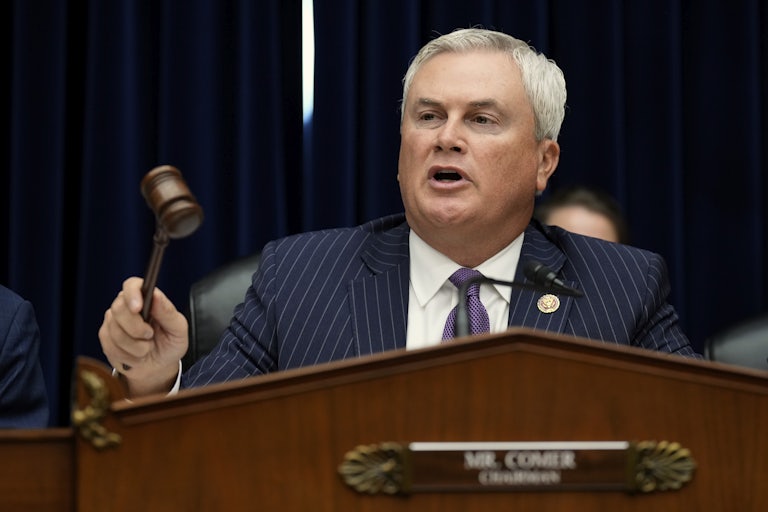Mr. President, Don’t Let Netanyahu Drag Us Into World War III
Biden’s Oval Office speech tried to connect Israel and Ukraine, but there are very important differences between the two countries’ predicaments.

Joe Biden gave an excellent and statesmanlike speech
Thursday night. He laid out the big picture well, tying America’s fate to the
world’s. He spoke sympathetically toward the Israelis who have suffered in the
wake of Hamas’s butchery, as any American president would. But he also
recognized the humanity of the Palestinian people, which not any American
president would necessarily do. The best parts were the words aimed at
Palestinian Americans and Arab Americans generally: “We can’t stand by and
stand silent when this happens. We must without equivocation denounce
antisemitism. We must also without equivocation denounce Islamophobia. And to
all you hurting, those of you who are hurting, I want you to know I see you.
You belong. And I want to say this to you: You’re all America. You’re all
America.”
And yet, I’m a little bothered by one thing. Biden spoke repeatedly, as he has in recent days, of the defense of Israel and Ukraine as if they were the same thing. In one sense, for the moment, they are. Ukraine was the victim of an attack; Israel was the victim of an attack. The attackers in both cases hold values that democracies oppose and represent the forces of reaction.
However, there are some important differences. Ukraine did little to provoke Russia. Vladimir Putin’s puppet was toppled in a revolution because he stood athwart the will of the large majority of the people to establish closer ties with the West. That did not provide Putin with a legitimate reason to start meddling in Ukraine, but it did provide his pretext. More broadly, he insists the whole country is a fiction in the first place, and he’s been invading Ukraine in one way or another for nearly a decade. Israel, on the other hand, has been running a brutal occupation for 56 years and a blockade of Gaza for 16 years. No, I am of course not saying that this history means that Israel in any way “deserved” what happened on October 7. I am saying simply what I’m saying—that the background circumstances of the two conflicts are vastly different.
Those background circumstances make the goals in each case very different. In Ukraine, the goal is simple and clear, if quite difficult to achieve: repel the authoritarian invader and help Ukraine maintain its independence with as much of its recognized land as possible. In Israel, the goal is … what? This is what people have been debating fiercely over recent days. Decapitate Hamas? OK. But that’s a really complicated thing to do, given the reality on the ground (all those tunnels). It’s a lot more complicated than pushing an invader back to the status quo borders.
And if Israel does decapitate Hamas, what comes next? It’s not like the people who replace Hamas are going to be peace-seeking small-d democrats who accept the existence of Israel. Is Israel to reoccupy Gaza? Nearly everyone agrees that that would be an utter disaster. But how does it not come to that, or something like that, if this war drags on and Israeli soldiers are on the ground in Gaza for some period of time?
This leads to a third difference between the two situations, which revolves around the risk involved for the United States. The risk for the United States in arming Ukraine is comparatively low. Yes, Putin is dangerous and not entirely predictable; if someday he’s really cornered, he could deploy a tactical nuke. But he’s probably hesitant to directly provoke the U.S. into confrontation. To do that, he’d have to invade a Baltic state—not impossible, but I suspect not likely. With a military as exposed as his has been, it seems doubtful that he wants war with the most sophisticated army in the world.
The war in Israel, though, could spread. That isn’t hard to imagine at all. Hezbollah is armed to the teeth and dedicated to Israel’s destruction. If there’s a long ground war in Gaza, how long is Hezbollah just going to sit there and watch? And if Hezbollah gets involved, that means Iran gets more directly involved. A U.S. Navy warship on Thursday intercepted three missiles from Yemen that appeared headed for Israel. If Israel is under attack from two (or three) sides and needs help, there is probably only one country in the world that will rise immediately to its defense. We sent those carriers over there for a reason.
Finally, there’s one more difference in the two cases: the leaders involved.
In Ukraine, we have a democrat who has risen to the historical occasion. If Ukraine somehow wins this war, there will be statues someday to Volodymyr Zelenskiy not just in Ukraine but across the world (unless the world is conquered by its darker forces, which is not alas impossible), emblazoned with his imperishable comment from the early days of the invasion: “I don’t need a ride. I need ammunition.”
In Israel … well, you know. We have a corrupt, extremist double-dealer who has spent the year trying to destroy one of the pillars of Israeli democracy so he can stay out of jail. If Benjamin Netanyahu is capable of that, then he’s capable of taking actions here that draw the U.S. deeper and deeper into this conflict, especially given his rising and rampant unpopularity in Israel right now.
It’s understandable why Biden, publicly and for now, pairs the two situations. But I hope that privately he and his top foreign policy officials are pushing Israel hard to keep this as brief and humane as possible and when it’s done start talking again about a peace process. Biden has been drawing on his decades of foreign policy experience. Alas, he’s going to have plenty more opportunities to do so.








